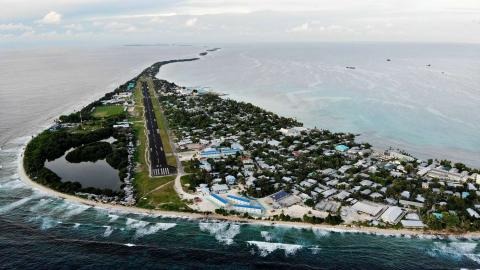By Jenny Hayward-Jones, Director of the Lowy Institute's Melanesia Program and Philippa Brant, Research Associate
The full extent of the devastation wrought by Cyclone Pam in Vanuatu and to a lesser degree Tuvalu, Kiribati, Solomon Islands and Papua New Guinea, is not yet known. But images of the damage in Vanuatu have been heartbreaking. Vanuatu's Government is understandably overwhelmed by the scale of the disaster and has reached out for international help.
Australia, New Zealand and France quickly mobilised military assets under the FRANZ Arrangement to undertake reconnaissance of the cyclone damage and coordinate the delivery of immediate relief assistance.
Australia is Vanuatu's largest bilateral aid donor, with the annual program currently worth AUD$60.4 million. Australia also has significant capacity to respond to disasters in the Pacific Islands region. Foreign Minister Julie Bishop announced two early packages of assistance, detailed here and here, including $5 million for NGOs/UN agencies, humanitarian supplies and crisis and disaster response teams. Importantly, an Australian Medical Assistance Team and an Urban Search and Rescue Team are being deployed to focus on immediate support for Port Vila Central Hospital and other medical and infrastructure needs. A much larger package of assistance from Australia will almost certainly be allocated when Vanuatu's Government is able to make a full assessment of its needs.
Other international partners have also been quick to offer assistance. New Zealand announced financial support of NZ$2.5 million for Vanuatu and the other nations affected by Cyclone Pam. It is also using military assets to assist with reconnaissance and, like Australia, sending health and logistics personnel. [fold]
France has provided significant logistical and technical assistance, which will likely expand in the coming weeks. The UK is also assisting with logistical efforts and has made up to £2 million available for relief. The EU has committed €1 million.
Indian Prime Minister Modi tweeted his sympathy for the people of Vanuatu and promised that the Indian Ministry of External Affairs would provide immediate financial assistance.
The Chinese Government has promised to 'extend disaster relief assistance to the government of Vanuatu' and has thus far offered emergency humanitarian assistance of US$100,000 through the Red Cross Society of China. China is usually slow off the mark (in part due to rigid decision-making processes) and is likely to provide further assistance. China has been looking for ways to improve its foreign disaster assistance response and this would be a good opportunity for it to coordinate with other development partners.
Vanuatu's Melanesian neighbours have also shown strong support, with PNG's Prime Minister Peter O'Neill announcing a package of 5 million kina (AUD$2.4m) for the Vanuatu and 1 million kina (AUD$482,000) for Tuvalu. PNG will also send an assessment team to assist with recovery efforts. Fiji is sending a relief team and emergency supplies.
The Red Cross, a number of international NGOs, and UN agencies with a presence in Vanuatu are also involved in the immediate relief effort.
The people of Vanuatu are famously resilient.
Up to 85% of the population of 267,000 live a subsistence lifestyle across the archipelago of 83 islands. Coping with regular natural disasters are a part of life for the ni-Vanuatu people. The Vanuatu Government has estimated that up to 70% of households may have been displaced. We've already seen images of people cleaning up and helping each other. People are sleeping in evacuation centres where they can, but working during the days to clean up and repair their houses and villages. Fortunately for people living in rural areas, their dependence on traditional materials in house-building makes reconstruction a little easier and less costly. Rebuilding the hundreds of schools and critical infrastructure will be a much more difficult task. Providing emergency food supplies is critical, but long-term options are also needed for rural people whose food gardens have been destroyed.
Given China's increased engagement in the Pacific, the region will be looking closely at its response. It has provided substantial support for Vanuatu's infrastructure development since 2006 (73% of its aid has been in the transport sector) and could take a prominent role in reconstruction efforts. A responsible act would be to suspend current loan negotiations and offer assistance as grants and other in-kind aid.
Vanuatu will need to be consulting with international partners in the coming weeks – not only about urgent humanitarian assistance but also about ensuring support is available for long-term reconstruction and for restoring the food security of the ni-Vanuatu people.
